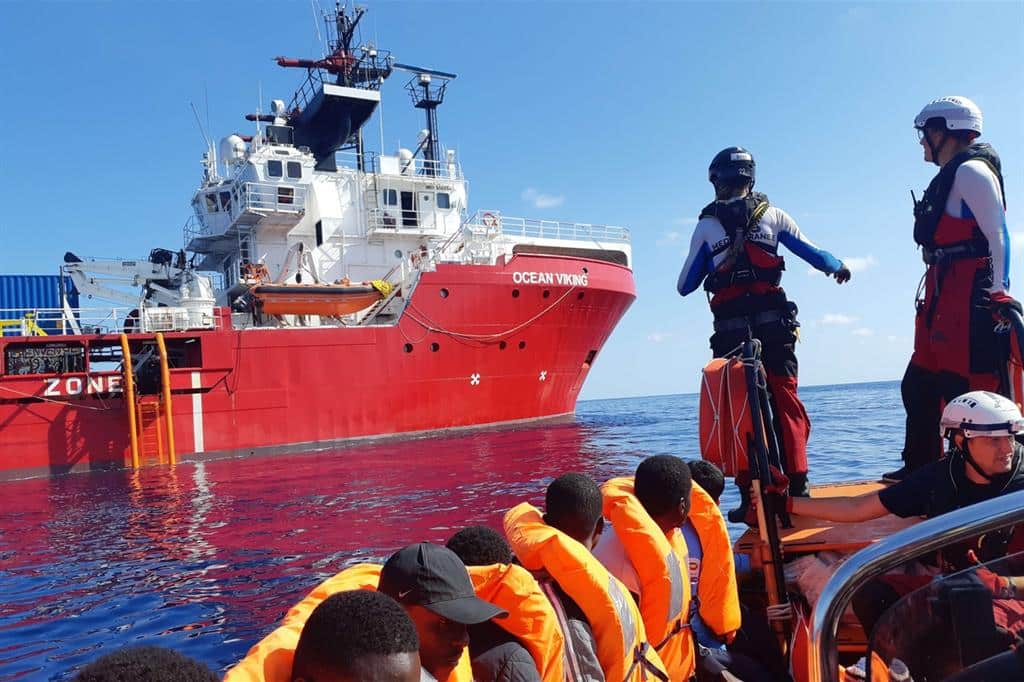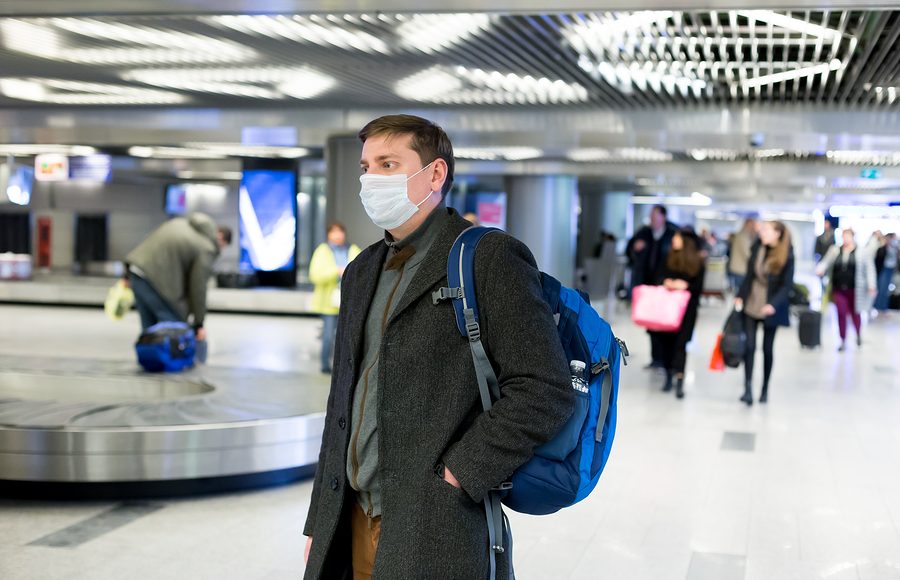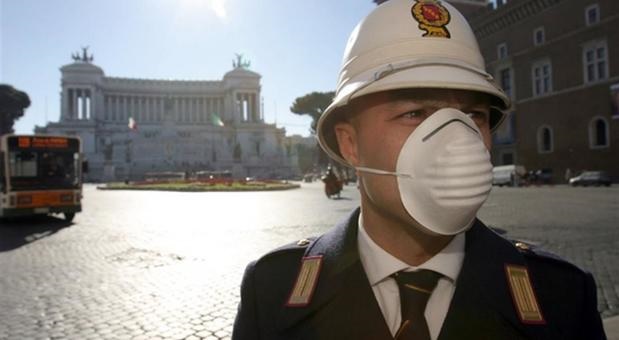By Enza Ferreri
This article was published in Italy Travel Ideas and is our second post on the subject, here's the first on Coronavirus and Italy.
Italian physician and psychiatrist Alessandro Meluzzi rightly described as paradoxical Italy's current policy of "closed schools and open ports", letting in migrants at such a time of emergency for Coronavirus (whose official name, which initially and temporarily was 2019-nCoV, has from early February become Sars-CoV-2, also adopted by the European Centre for Disease Prevention and Control (ECDC), while the disease it causes is called COVID-19).
If we don't close our borders others close theirs, Dr Meluzzi added.
This happened, in fact, and China itself was among the countries isolating Italy.
Dr Meluzzi was making correct predictions as early as 31 January, when he said in an interview:
"My feeling is that the Italian situation is already totally out of control".
He added that he considered with great concern the hypothesis of the spread of Coronavirus on the African continent:
"When the virus arrives in Africa, where countries do not have adequate health coverage to deal with the epidemic, this could spread in a potentially catastrophic way".
He referred to the great number of Chinese workers and companies in Africa, "which create a large flow of trade with China, especially with the industrial area from which the epidemic originated", concluding: "I dare not imagine what could happen in Africa."
From China to Europe via Africa
The African "bomb" became a later alarm about Coronavirus and its further spread in the world.
There are two factors that greatly elevate the potential risk of contagion: one is the thriving trade relations between China and Africa, the other is the uncontrolled immigration that from Africa regularly arrives in European countries overlooking the Mediterranean Sea, particularly Italy.
Let's be frank: when we say "uncontrolled", it is very literal. We know nothing of many, indeed probably the great majority, of people landing on our shores from smugglers' boats and NGO ships, since they have no documents or false documents. In a very high number of cases we don't even know their name, let alone their past history, criminal record and health status. The newspaper Il Giornale wrote:
Italy hosts immigrants at its own expense without having the slightest idea who they are. To know their stories, we rely on the stories given by them in front of the various commissions.
For their personal identities, we are satisfied with having them put their name and surname in writing the moment they disembark...
In Italy, in fact, thousands of people arrive who can carry with them cell phones but never a shred of an identification document.
Hardly Any of the Arrivals Are Refugees
There have been cases of fake refugees who disclosed to the media that they paid thousands of euros to obtain ways to claim asylum status.
For a long time Italy has been literally overwhelmed by would-be asylum seekers and migrants. A Nigerian interpreter and "cultural mediator", calling himself Uchenna, has explained how it works:
To judge asylum seekers there should be 4 people for each commission [called 'territorial commission'], who include representatives for the UNHCR (UN Refugee Agency), Italian police and local authorities. Now, there are only 1 or 2 left to follow the interview because there are several organisational problems... so many requests arrive that if they were all present at each interview, it would never end. The system is practically collapsing.This means that in some cases the waiting times for obtaining the opinion of the commission can be extremely long. Meanwhile, Italy hosts many immigrants at its own expense, who will then never obtain refugee status. And they are a very high number. Says Uchenna: "The majority of those who are arriving on the Italian coast from Nigeria certainly do not run away from dangers: they are looking for money and success to be able to return home one day and strut the wealth achieved".
He explained that to do this, therefore, many times they invent stories of suffering and persecutions that they have never undergone: "I often hear the same identical story told by different immigrants".
Asked why everyone coming to Italy on the migrants' boats is undocumented, the interpreter answered: "Those who land in Italy say they never had a document or lost it in Libya. In Nigeria, falsifying documents and changing identity several times is normal. They do the same during recognition in Lampedusa".
But in Italy, he says, the 'poor thing' rule applies, explaining: "In the commissions we hear them say of every tale: 'Oh, what a poor man'. Yet these people often only tell lies."
Migrants, particularly those who seek asylum under false pretence, are also known for cutting, abrading and burning their fingertips to prevent identification.
Anna Bono, former University of Turin researcher in Africa's History and Institutions, who has long lived in Africa and has worked with the Italian Foreign Ministry, sums up the situation:
We now know with certainty that 95% of the foreigners who land in Italy are not refugees: they are not people exhausted from extreme poverty, they are not people who have escaped death threats, torture, deprivation of human rights.Prof Bono says that the vast majority of asylum seekers do not get asylum because they are not persecuted at home, nor are they fleeing wars.
They come from southern Nigeria, Senegal, Ivory Coast ... they are illegal immigrants. In 2016, 181,045 arrived, 123,482 of whom applied for asylum. The territorial commissions examined 90,473 requests, accepting 4,940 of them, namely 5.4% of the applications examined, 3.9% of those submitted and 2.7% of the total landings.
However, not all applicants rejected over the years have left Italy. Many of both fake asylum seekers and illegal immigrants remained in Italy, escaping the control of the authorities and often disappearing. With the "residence permit for humanitarian reasons" many have been allowed to live in Italy in hiding, doing illegal jobs or illegal activities.
Therefore it's not surprising to know that 1 in 3 inmates in Italian prisons is foreign. This gives some indication of a serious problem of security in the country, a danger that has been in existence for a long time.
Yet again, it should come as no surprise that people with no official identity, no ties with the larger community that hosts them, generally no family (they are mostly young men of military age) and few opportunities for legal jobs should be enormously overrepresented in crime statistics.
Incidentally, this statistic is similar in other European countries. In Germany, for example, as reported by Free West Media: "In a sample of the 3930 prison population of Berlin 31 March 2018, 51 percent had no German citizenship. Of the individuals in pre-trial detention facilities, 75 percent had foreign nationality, the Berliner Morgenpost reported."
The epidemic of the new virus simply adds to this grave risk, and, paradoxically, it seems almost to offer an opportunity to examine it.
It's terrible, though: it shouldn't have been necessary to face a dangerous epidemic to be allowed to more openly discuss it.
We must also mention a well-known illegal trafficking of identity documents among immigrants across various European countries, including Italy, Germany, Greece, involving even people who have been recognised as refugees.
This Migration Phenomenon Is Not Good for African Countries Either
As we've described in this previous article “Young People, Don’t Emigrate” Say African Bishops, Italy, with 1 in 3 youths unemployed, has nothing to offer to migrants. African Cardinals and Bishops themselves have repeatedly and constantly exhorted their flocks to stay at home and help their countries.
Those who emigrate are usually the best equipped and qualified to help their own economies. They are richer, otherwise they wouldn't be able to pay the expensive people smugglers, younger, stronger, more skilled, with more initiative than the rest of their population that they leave behind.
And no-one in his right mind can seriously think that Africa's poverty problems - which have nevertheless diminished over the last few decades - can be solved by transferring the 1.2 billion Africans (rapidly increasing as we are counting) to the continent of Europe, the world's smallest.
And why don't we ever hear the same people who, for self-declared humanitarian reasons, worry so much about illegal immigrants equally condemn the most atrocious persecution of Christians all over the world? Why don't they beat their chest, similarly, for those Italians who commit suicide because their business failed and they can't support their families? While Italy is paying to host and keep thousands and thousands of fake refugees and illegal immigrants, what about the Italians who also need help?
The series of articles on Italy and Coronavirus continues.
SOURCES
Stop Censura
Researchgate: Fingerprint Alteration
Il Giornale: Gli immigrati raccontano bugie
Dei profughi non sappiamo nulla
La NuovaBQ: Io, falsa rifugiata
Un detenuto su tre e' straniero
Free West Media
Traffico di identita'
PHOTO CREDIT
Il Primato Nazionale





